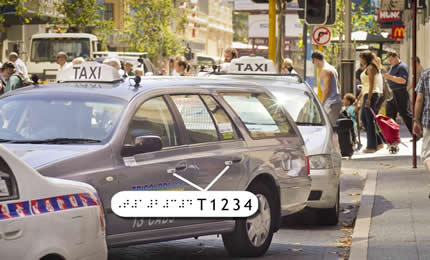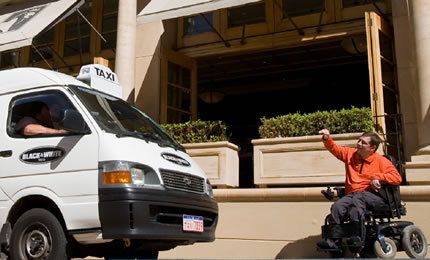Transport for people with disability
Information for people with disability, including taxi identification for people with vision impairment, travelling with an assistance animal, travelling with a wheelchair or mobility device and more.
Taxi identification for people with vision impairment or low vision

It is a Commonwealth Government requirement that taxis are recognised by people with vision impairment or low vision.
Raised taxi registration numbers are placed on the exterior of all taxi passenger doors, forward of the handle (as pictured).
Transporting an assistance animal
Assistance animals come in all shapes and sizes and are highly trained to meet behavioural and hygiene standards.
Under the law, passenger transport drivers in WA must not refuse to carry an assistance animal or an assistance animal in training.
Refusing to carry an assistance animal is an offence. You can be issued an infringement of $9,000 if you refuse to carry an assistance animal in your passenger transport vehicle.
Partnering with assistance animals helps many people with disability to live independently and provides a range of physical and emotional benefits. We all have a responsibility to ensure people who partner with assistance animals are supported in accessing transport that meets their needs.
For further information, visit the Australian Human Rights Commission website (below).
| Australian Human Rights Commission website | ||
|---|---|---|
Wheelchair and mobility device accessible transport
Wheelchair accessible rank or hail vehicles (WAVs) are specially equipped to provide essential transport for people with disability or mobility difficulties. WAVs are available in metropolitan and regional areas throughout Western Australia.
The dedicated WAV on-demand booking service, Black and White Cabs, is appointed to provide reliable and consistent service for passengers using wheelchairs or mobility devices.
To book a WAV in the metropolitan area contact Black and White Cabs. To book a WAV in regional areas, contact your local on-demand booking service to discuss your transport needs.
| Black and White Cabs | ||
|---|---|---|
Guidelines for passengers with a wheelchair or mobility device

It is important to familiarise yourself with how you and your wheelchair should be restrained to be transported safely.
Where practical, it is preferable that passengers transfer out of their wheelchair when being transported. If you require transportation while seated in your wheelchair, you should seek your own advice to determine the most appropriate type of wheelchair for you for this purpose.
Please note: wheelchair accessible taxis are only designed to transport people seated in wheelchairs. It is not safe to carry, load or unload passengers while seated on a mobility device/gopher. Passengers who use a mobility scooter must transfer from their scooter before it is loaded into the vehicle. A mobility scooter cannot be used as a seat while people are being transported.
If you have any concerns about your safety while travelling, you should contact the on-demand booking service you travelled with. You can also contact On-demand Transport for support.
Passenger Transport Subsidy Scheme (PTSS)
The Passenger Transport Subsidy Scheme (PTSS) is a subsidy available to eligible people with disability travelling in on-demand rank or hail (taxi) vehicles. PTSS participants can receive up to 75% off eligible taxi fares.
PTSS is an important part of the Department of Transport’s commitment to enabling safe, accessible and efficient movement for the economic and social prosperity of Western Australia.
For more information, visit Passenger Transport Subsidy Scheme.
Making a complaint
Service complaints
If you believe you have been overcharged or have experienced poor customer service during your trip, you should make a complaint directly to the relevant on-demand booking service.
This may include issues relating to:
- service delivery;
- failure to pick up passengers;
- failure to accept the Passenger Transport Subsidy Scheme (PTSS) or Taxi User Subsidy Scheme (TUSS);
- driving ability, including not following road rules and traffic laws;
- inappropriate driver conversation or behaviour;
- driver attitude or hygiene;
- over charges or fare discrepancies;
- condition of the vehicle; or
- lost property.
If you are unsatisfied with the response you receive from the booking service, you may wish to investigate your options with the Consumer Protection branch at the Department of Mines, Industry Regulation and Safety.
On-demand booking services are required to accept and work towards resolving your complaint within a reasonable timeframe. If the on-demand booking service has not responded to your complaint in a timely manner (usually 10 working days), then you can lodge a separate complaint with the Department of Transport regarding the lack of response. You will need to provide information about when and how your complaint was lodged with the on-demand booking service.
If you are unable to identify the on-demand booking service, you can email the details of the incident to the Department of Transport. DoT will strive to identify the on-demand booking service and provide you with their details so you can lodge a complaint.
Criminal and traffic offences
Criminal offences such as physical or sexual assault and traffic related offences must be reported to WA Police. If required, the Department of Transport will assist with any police investigation.
Reporting other offences
On-demand Transport receives and manages reports about the passenger transport industry (including taxi, rideshare and charter companies), where the reported issue relates to possible offences under sections of the following legislation:
- Transport (Road Passenger Services) Act 2018; and
- Transport (Road Passenger Services) Regulations 2020.
To make a report related to the above legislation, email On-demand Transport.
For further information, contact On-demand Transport.
| Department of Commerce: Consumer Protection Division | ||
|---|---|---|
| WA Police | ||
| Transport (Road Passenger Services) Act 2018 | ||
| Transport (Road Passenger Services) Regulations 2020 | ||




